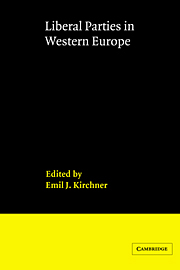Book contents
- Frontmatter
- Contents
- List of tables
- List of diagrams
- List of maps
- Notes on the contributors
- Preface
- 1 Introduction
- 2 Between left and right: the ambivalence of European liberalism
- 3 Two roads of Italian liberalism: the Partito Repubblicano Italiano (PRI) and the Partito Liberale Italiano (PLI)
- 4 The FDP in the Federal Republic of Germany: the requirements of survival and success
- 5 Great Britain — social liberalism reborn?
- 6 Liberalism in France
- 7 Liberal parties in the Netherlands
- 8 The Belgian liberal parties: economic radicals and social conservatives
- 9 The Freiheitliche Partei Österreichs: protest party or governing party?
- 10 The Swedish Liberal Party: The politics of unholy alliances
- 11 Liberalism in Denmark: agrarian, radical and still influential
- 12 The Norwegian Liberal Party: from political pioneer to political footnote
- 13 Liberal parties in Finland: from perennial coalition actors to an extra-parliamentary role
- 14 Liberal parties in Switzerland
- 15 The Luxemburg Liberal Party
- 16 Identifying liberal parties
- 17 Ambivalence revisited: an analysis of liberal party manifestos since 1945
- 18 Transnational links: the ELD and Liberal Party Group in the European Parliament
- 19 Western European liberal parties: developments since 1945 and prospects for the future
- Index of political parties
- General index
18 - Transnational links: the ELD and Liberal Party Group in the European Parliament
Published online by Cambridge University Press: 16 November 2009
- Frontmatter
- Contents
- List of tables
- List of diagrams
- List of maps
- Notes on the contributors
- Preface
- 1 Introduction
- 2 Between left and right: the ambivalence of European liberalism
- 3 Two roads of Italian liberalism: the Partito Repubblicano Italiano (PRI) and the Partito Liberale Italiano (PLI)
- 4 The FDP in the Federal Republic of Germany: the requirements of survival and success
- 5 Great Britain — social liberalism reborn?
- 6 Liberalism in France
- 7 Liberal parties in the Netherlands
- 8 The Belgian liberal parties: economic radicals and social conservatives
- 9 The Freiheitliche Partei Österreichs: protest party or governing party?
- 10 The Swedish Liberal Party: The politics of unholy alliances
- 11 Liberalism in Denmark: agrarian, radical and still influential
- 12 The Norwegian Liberal Party: from political pioneer to political footnote
- 13 Liberal parties in Finland: from perennial coalition actors to an extra-parliamentary role
- 14 Liberal parties in Switzerland
- 15 The Luxemburg Liberal Party
- 16 Identifying liberal parties
- 17 Ambivalence revisited: an analysis of liberal party manifestos since 1945
- 18 Transnational links: the ELD and Liberal Party Group in the European Parliament
- 19 Western European liberal parties: developments since 1945 and prospects for the future
- Index of political parties
- General index
Summary
background and historical development
International co-operation of political parties belonging to the same political-ideological ‘family’ in the framework of ‘Internationals’ is a well-known phenomenon. Parties understand such organisations primarily as round tables for exchanging views and discussing ideas in a rather general manner. In 1947, liberals established the Liberal World Union, now renamed as the ‘Liberal International’, as such a forum for mutual information and communication. It has to be regarded as a loose grouping, since the participating parties did represent the whole broad spectrum of liberal positions. The Liberal Manifesto of Oxford, adopted at the founding convention in 1947 – amended in 1967 with the Liberal Declaration of Oxford – did reflect the political heterogeneity of the member parties; it was too general to serve as a basis and programmatic guideline for common activities. The members regarded the organisation as a loose but useful forum.
In 1952 the ‘Mouvement Libéral pour l'Europe Unie’ (MLEU) was founded as an organisation which should concentrate its activities on issues of European unification; the MLEU was independent from the Liberal International. In 1961 membership in this specialised organisation was restricted to parties and politicians from EC countries only. In 1972 the MLEU was incorporated as a regional organisation into the Liberal International, which since 1969 had started to promote the establishment of closer links and more intense co-operation amongst liberal parties from EC countries, adding to the consolidation of the community.
- Type
- Chapter
- Information
- Liberal Parties in Western Europe , pp. 455 - 469Publisher: Cambridge University PressPrint publication year: 1988
- 2
- Cited by



